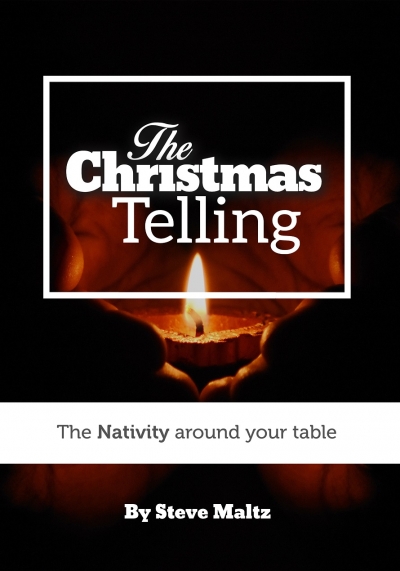Paul Luckraft reviews ‘The Christmas Telling’ by Steve Maltz (Saffron Planet Publishing, 2019).
This 16-page booklet aims to recapture the Christian meaning of Christmas which is often lost among the tinsel, revelry and mammon overkill. Maltz asks, how can we overcome the attempts of our secular society to convert Christmas into a festival of over-indulgence? Is there a way to reclaim the core image of the miracle of the Incarnation and the joy that it brings?
His answer lies in the Jewish tradition of the Passover seder, where families and friends gather around a dining table to hear the story (‘telling’) of the Exodus. This is acknowledged as a hugely effective tool to pass down the true meaning of this event from generation to generation, as commanded in Deuteronomy 6:6-7.
The Passover celebration not only centres on a meal but also engages all five senses in the storytelling. Likewise, The Christmas Telling provides a similar framework for the story of the birth of Jesus. Maltz’s booklet is effectively a haggadah, following the pattern of the traditional handbook for the Jewish seder night. As written it lasts about 40 minutes, although it can be extended by including a full meal, or a short extra message, or other optional activities. It is suitable for both children and adults, Christians and non-Christians, with fun elements, serious elements and plenty of interactivity.
Maltz’s hope is that it will “reignite a spark or two for some or provide a fresh perspective for others who have never really engaged with the wonderful story of the Incarnation.”
‘The Christmas Telling’ is available from the publisher for £3, or six copies for £12.
 Ian Farley reviews ‘Wake Up to Advent’ by John Sentamu (SPCK, 2019).
Ian Farley reviews ‘Wake Up to Advent’ by John Sentamu (SPCK, 2019).
The Archbishop of York’s Advent book for 2019 is laid out in four catchy, simple sections calling us to ‘Wake Up’, ‘Clean Up’, ‘Feed Up’ and ‘Grow Up’. Each day features a Bible reading followed by a devotion, a prayer and a personal challenge on which the reader can ruminate for the rest of the day. The Bible passages are relatively short, perhaps with the purpose of getting busy people to commit to daily readings during Advent.
Despite the pithy style, the Archbishop does not necessarily stick to easy subjects. He addresses the place of hell with compassion and clarity; he has helpful insight into the perennial trial of coping with life when things go wrong.
The style of writing is somewhat disjointed, with paragraphs often composed of just one or two sentences. This makes for an easy scan and allows a scattering of personal stories through the book, but can prevent the build-up of a reasoned argument.
Furthermore, the Archbishop’s record on moral issues (e.g. sexuality and gender) may cause some to avoid his writing, understandably. However, for those who decide otherwise, they will find in this book a friendly Anglican commentary for the Advent season that should provoke reflection and conversation. It is not suitable as a basic introduction to Christianity, but it may be of interest to friends who are at the stage of being willing to read little bits of the Bible.
‘Wake Up to Advent’ (144pp) is available from the publisher, from Amazon and elsewhere online in both paperback and e-book forms.
